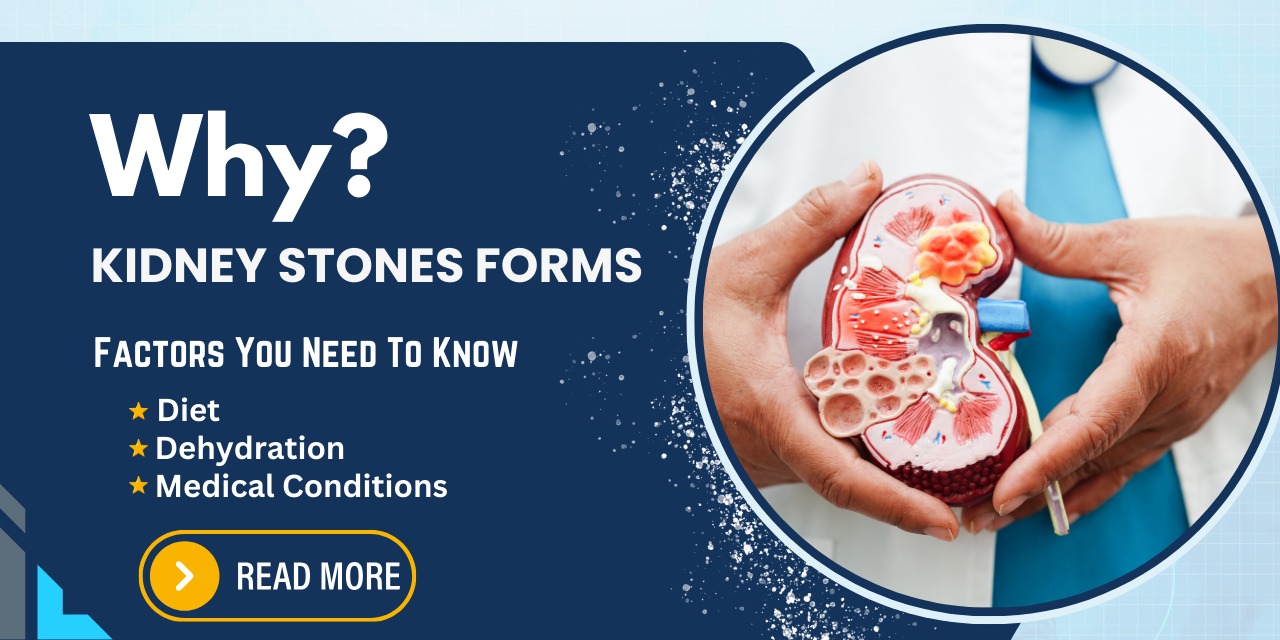Kidney stones, those tiny, hard deposits that form inside your kidneys, can cause a lot of pain and discomfort. Understanding why they form and how to treat them can help you avoid their painful impact on your life.
What Are Kidney Stones?
Kidney stones are solid pieces of material that form in the kidneys from substances in the urine. They can be as small as a grain of sand or as large as a golf ball. Most kidney stones are made up of calcium, but they can also be composed of other substances like uric acid, struvite, and cystine.
Why Do Kidney Stones Form?
Kidney stones form when there is an imbalance in the substances that make up urine. Several factors can contribute to this imbalance:
➤Dehydration: Not drinking enough water can lead to concentrated urine, which increases the chances of stone formation.
➤Diet: Consuming too much salt, protein can increase the risk of kidney. Foods high in oxalates, such as spinach, nuts, and chocolate, can also contribute.
➤Medical Conditions: Certain medical conditions, such as urinary tract infections, hyperparathyroidism, and some metabolic disorders, can lead to the formation of kidney stones.
➤Genetics: A family history of kidney stones can make you more prone to developing them yourself.
➤Medications: Some medications, including diuretics and calcium-based antacids, can increase the likelihood of forming kidney stones.
Symptoms of Kidney Stones
Kidney stones can cause a variety of symptoms, depending on their size and location. Common symptoms include:
- Severe pain in the back, side, or lower abdomen
- Painful urination
- Blood in the urine
- Nausea and vomiting
- Frequent urge to urinate
- Cloudy or foul-smelling urine
If you experience any of these symptoms, it’s important to seek medical attention.
Kidney Stone Treatment Options
The treatment for depends on their size, type, and location. Here are some common treatment options:
- Drinking Water: Staying hydrated is crucial. Drinking plenty of water can help flush out smaller stones and prevent new ones from forming.
- Medications: Pain relievers can help manage the pain. Doctors may also prescribe medications to relax the muscles in your ureter, helping the stone pass more easily.
- Medical Procedures: For larger stones or those that don’t pass on their own, medical procedures may be necessary. These include:
- Extracorporeal Shock Wave Lithotripsy (ESWL): This non-invasive procedure uses sound waves to break the stones into smaller pieces that can be passed in the urine.
- Ureteroscopy: A thin scope is inserted through the urethra to locate and remove or break up the stone.
- Percutaneous Nephrolithotomy: In more severe cases, a small incision is made in the back to remove the stone directly.
- Extracorporeal Shock Wave Lithotripsy (ESWL): This non-invasive procedure uses sound waves to break the stones into smaller pieces that can be passed in the urine.
- Surgery: In rare cases, when other treatments are not effective, surgery may be needed to remove the stone.
Avoiding Kidney Stones: What Not to Do
Here are some tips to reduce your risk:
Stay Hydrated: Drink plenty of water throughout the day to keep your urine diluted.
Eat a Balanced Diet: Reduce your intake of salt, and foods high in oxalates. Include plenty of fruits and vegetables in your diet.
Limit Protein: Eat meat and other protein-rich foods in moderation.
Monitor Calcium Intake: Get your calcium from food rather than supplements, as excessive calcium supplements can increase the risk of stones.
Stay Active: Regular physical activity can help maintain a healthy weight and reduce your risk.
Conclusion
How to treat them can help you take proactive steps to prevent them. By staying hydrated, maintaining a balanced diet, and seeking medical attention if you experience symptoms, you can reduce your risk of kidney stones and enjoy better health. Taking these measures not only helps prevent kidney stones but also promotes overall well-being. So, make these healthy habits a part of your daily routine and keep your kidneys stone-free. For the best kidney care Hospital in Jalandhar, contact on +9189685 85352. Follow us on Instagram for more health tips.

